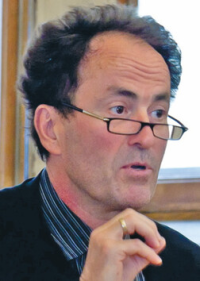
The Department of History is saddened by the passing of our colleague Mario Biagioli, who taught at UC Davis from 2010 to 2019. Mario was the founding director of UC Davis’ Center for Science and Innovation Studies and held appointments in the School of Law, Science and Technology Studies, and History. Most recently he was Distinguished Professor of Law and Communication at UCLA, where he had begun his academic career. He also taught History of Science at Harvard University.
Mario received his MFA in Visual Studies from the Rochester Institute of Technology in 1984 and his PhD in history from UC Berkeley in 1989. He first rose to prominence with the publication of Galileo: Courtier (Chicago, 1993), which immediately became an important reference point in the new social history of early modern science. He played a significant role in advancing the emerging field of science studies by editing the landmark Science Studies Reader (Routledge, 1999). Galileo’s Instruments of Credit (Chicago, 2006) further consolidated his reputation, rooting Galileo’s intellectual biography now not only in local social context but in the more contingent context of legal, scientific, and religio-political disputes and in material culture. By the early 2000s he was turning his attention increasingly to matters of intellectual property and ultimately to issues of academic misconduct related to plagiarism and manipulation of the proliferating metrics-based systems for the assessment of scholarship, culminating with the publication of Gaming the Metrics: Misconduct and Manipulation in Academic Research (MIT, 2020).
Biagioli published dozens of essays in a wide range of historical, theoretical, and legal journals and essay volumes in his multiple fields of expertise; and he played an important role as editor and co-editor and as an intellectual mentor to other scholars. A special issue of the journal History of Science in 2006 (Artisans and Instruments) examined themes central to Galileo’s Instruments; Scientific Authorship (Routledge, 2003) and Making and Unmaking Intellectual Property (Chicago, 2011) reflected his focus on intellectual property; From Russia with Code (Duke, 2019) examined the global role and careers of Russian IT professionals in the two decades since the collapse of communism.
The recipient of a multitude of honors, awards, and academic appointments reflecting his expertise in history, the law, communication, technology studies, and media studies, Mario also played an leadership and professional mentoring role across multiple disciplines.
Mario’s boundless intellectual energy, his collegiality and collaborative talent, and his wry good humor made him an intellectual and academic leader, an engine of interdisciplinary innovation, and a driver of intellectual cross-fertilization. His passing is a great loss to the University of California and to the academy internationally.
- Edward Ross Dickinson